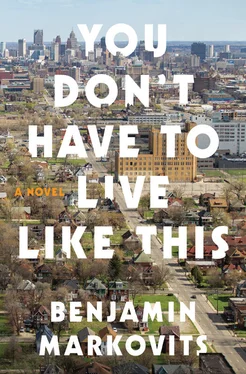“I don’t understand.”
“It looks like the suspect was probably known to the girl.”
“What does that matter?”
“For one thing it means she hasn’t been telling the truth — at least, not the whole truth. Rape is almost always my word against yours. Where the victim is the only witness, and there’s a good reason to question her credibility, it’s very, very hard to get a conviction. Plus in this case another interpretation suggests itself. That she had a fight with her boyfriend and left the club with some guy she just met and afterwards, maybe when she sobered up, regretted what she did and tried to pin the whole thing on the guy. I’m not saying it wasn’t rape. This guy has previous convictions, including domestic assault, and maybe she changed her mind before they got back to the apartment. Maybe he got a little rough, maybe he even raped her, but if he did, it’s going to be hard to prove because there’s a pretty good case that she lied about the rest.”
“So that’s why they didn’t do anything.”
“That’s why. Are you finished with this?” he said, and took my can and his and threw them away. On the way out he asked me: “What’s your relation to this woman anyway?”
“I picked her up hitchhiking when I drove to Detroit.”
“It all figures. Let me give you some advice you probably don’t want to hear. Everybody lies. This is what you learn from forty-six years as a cop. And victims and witnesses have just as much reason to lie as the people it’s your job to lock up.”
“How is that advice?” I said.
Meanwhile, my life went on. The school year was coming to an end and Gloria and I arranged a field trip together. We took a group of ninth graders to visit Franklin Mayer’s farm, which was only about a five-minute drive by rented bus from Kettridge High. Most of the kids had seen the barbwire fence around it. There were security issues early on, people stealing equipment and fertilizer, and Franklin had instituted an ID system. But I wanted these local kids to get a look at what was happening on the other side of the barbwire.
It rained in the morning but cleared up enough for us to get out on the fields after lunch. A lot of the people who worked the farm came for just a few days or maybe a few weeks, and Franklin didn’t expect them to buy their own clothes. There was a changing room with lockers full of gear. So the kids got to put on rubber boots and wade out on the soft earth.
Franklin took us around. I liked this guy, but he wasn’t somebody you had to listen to. He talked a lot, his big good-looking red face looked a little sunburned, too, and he wasn’t at all shy leading forty homegrown Detroiters through what used to be one of their neighborhoods. We started out with the cucumber patch and the kids put down a few seeds. “Man, it smells like shit here,” one of them said, and Franklin said, “It smells like three different kinds of shit.”
“I never met a white farmer before.”
“What do you mean?”
“I thought it was all like Mexicans.”
“It’s interesting you should say that,” Franklin said, “because one of my uncles, one of my great-uncles, was an attaché to Heinrich von Eckardt. You know von Eckardt? He was the German ambassador to Mexico in 1917, the one who received the Zimmermann Telegram. They wanted to get Mexico on board in case America entered the war, which of course we did.”
This is how he talked, and most of the kids got a kick out of him.
He pointed out squash beds and potato beds, tomato plants, rhubarb patches, and zucchini vines strung up on posts and wires. There were also young peach and apple orchards; the trees looked like twigs stuck in the ground. He walked us along the side of wide grain fields and stopped to have a word with a couple of guys. “If any of you wants a summer job,” Franklin said, “talk to Pete.”
Pete was Pete Chaney, a former high school English teacher, as it happens. I knew him slightly; he was a recovering alcoholic and had two teenage girls back in Billings. His wife still worked at the Gazette and couldn’t decide whether or not to divorce him.
There were animals, too, a handful of cows, three pigs, chickens in a coop, even a horse named Toto, which Franklin kept for no other reason than that he liked to ride it around the farm. Just at the end he let us dig up a few early potatoes, which were still very small, to show us what they looked like.
“I ain’t eating nothing I have to dig out of the dirt.”
“Where do you think French fries come from?” Franklin said.
“McDonald’s.”
The kids had a good time but Gloria didn’t seem comfortable or happy. “Okay, I get it, it’s very funny, ha-ha,” she said to me at one point.
“What’s wrong?”
“He’s hamming it up.”
“That’s just what he’s like,” I said.
We could hear the traffic on I-94 over our heads, competing against the noise of birds, grackles and jays on some of the trees and crows in the fields. The whole visit took two hours; most of what we ended up doing was crowd control. Afterwards the kids changed out of their muddy clothes and washed their hands. There was a shack next to the changing room where you could buy whatever was in season, lettuces and radishes, etc. Just as we were leaving the young guy behind the counter accused some girl of stealing asparagus. He said, “Hey, where you going with that,” and Gloria grabbed her and spun her around.
“I didn’t do anything,” the girl said, but we opened her handbag and found about half a dozen stalks.
“The man said I could. I said what’s that and he said, take some.”
“I didn’t tell her that.” He had a paper-white foreign-looking face; his accent sounded flavored by the movies.
But the girl meant Franklin, who came out of the bathroom drying his hands and said, “It’s true.”
“Why you jump on me like that, Miss Lambert,” the girl said. Her name was Mabelle Johnson. She was one of these bony-butted black girls and wore her hair real tight on her head, in pigtails. “You know me better than that.”
On the bus ride home Gloria apologized to her, but she also said, “I don’t care who said what. You make sure the people who need to see what you’re doing are seeing what you’re doing. That’s just common sense.” But Mabelle just pushed up her lip and turned her shoulder. She was one of my kids, an okay kid, but a talker in class, who was hard to shut up because maybe 20 percent of the time she had something to say.
Gloria seemed disproportionately upset by the whole thing. We drove back to my place after school, in two cars, and did a little shopping together. Then I cooked while she graded papers.
“You’re a little quiet,” I said to her over supper.
“I didn’t have fun today. Why didn’t I have fun? I always used to think I was having fun.”
“It’s a field trip. The teacher isn’t supposed to have fun.”
“No, but I like field trips. That’s not it.”
“You want to tell me what is?”
She shook her head.
Later that week we talked about it again. She stayed over on Friday night and sometimes when I pushed a little hard in bed she got out of it by starting emotional conversations. We went to bed early but then kind of wrestled for a bit and gave up. But I was too frustrated to sleep, and then my restlessness woke her and we talked. It was around one in the morning.
My bedroom was on the top floor. Robert James made a big deal about getting little things to work, like neighborhood street lamps, and the light from the street came in through my curtains, bright enough I could see her dark face. But her expression was hard to read. Her eyes looked very large and white.
Читать дальше












